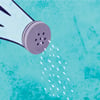
If I can say so myself, I happen to be a pretty good challah maker. While I generally don’t bake, and can’t handle recipes that need to be exact or look a specific way, challah has always been my specialty.
Until this past week.
It smelled good. It looked good. But it tasted . . . awful. It had no flavor, was the wrong consistency, and ultimately was not edible, as hard as my guests tried to smile and digest.
Now when I make challah, I work with about 15 lbs. of flour. (I want to make enough not only to separate the challah and make the blessing, but to have extra I can freeze!) That means a good few cups of sugar, a nice amount of oil, half a dozen or so eggs (see, I told you I’m not exact) and a much smaller dose of salt. It would seem that I must have forgotten a pretty main ingredient to ruin so much dough. But no, tracing back my steps, everything was included. Well, almost.
Too much or too little, and it will ruin itI forgot the salt.
To put this in perspective, we are talking only a few tablespoons of salt. That is all I use. But it turns out that it is the most crucial ingredient there is. Salt strengthens the gluten in the bread, it controls the action of the yeast, and it is a huge part of the flavor. Unlike the other ingredients, the salt is the most important for measuring and ensuring that the right amount makes it in. Too much or too little, and it will ruin it.
Meanwhile, salt on its own is inedible. No one wants to sit and eat a spoonful of salt. We could handle sugar straight up, even oil over our salad, but salt can be tolerated only in very small doses, and added to a food, not by itself.
So, what is the salt in our lives? It is the discipline. It is the rigidity. It is the boundaries and borders that are so very necessary. In small doses. We have to first add the sugar. And we use many times more sugar to the amount of salt. But it is actually the salt that brings out the sweetness of the sugar. (If you have ever been to Israel, this is why a popular food is watermelon with salty cheese . . . or try it yourself: add some sprinkles of salt on your watermelon, and you will see how it makes it so much sweeter.)
We often want to leave out the salt in our lives. It can be so much easier, or certainly seemingly sweeter, to focus on the love and kindness, the sugar, in our lives. The rules, regulations, boundaries and borders can be so hard, whether it be sticking to a schedule, disciplining children, or spending within a budget . . . at least for me. I’m definitely a kick-caution-to-the-wind-and-follow-my-heart kind of gal. But I have learned, the hard way, that by omitting the salt I have ended up with cranky and overtired children, a disorganized home and lack of control in many other areas of my life.
It is actually the salt that brings out the sweetness of the sugarTo combat this, we recently instituted chores and allowances. Yes, it took us many years, but finally we chose this path. It was hard for me to break down tasks, make a weekly assignment, and even more so, to try to stick to it. But try we have. And while we have a ways to go . . . this salt is making my life so much sweeter. Finally, when the kids ask for another few dollars, I can tell them it comes from their allowance money. If they don’t want to pay for it, they don’t want it badly enough. If they need it, I will cover it, but if they want it, then it is up to them. Finally, when the living room is a terrible mess, I can look at a chart and know whose responsibility it is that day, and who to ask, without having to hear a litany of complaints that I am not being fair or picking on one kid over the other.
The important thing is remembering that the salt needs to come in small doses, and really works only when mixed within the sweet. As long as I ensure that it is used to enhance and strengthen rather than guide and dominate, we benefit. After all, too much salt and it ruins everything. All you can taste is the salt, no matter what it went into. Too much salt in chicken soup or split pea soup results in just tasting salt. Whereas when you use only a little, then you can truly appreciate the flavors and subtleties within.
So even though this batch of challah is past the point of no return, I highly doubt I will forget the salt again, hopefully in any aspect of my life. And even though we won’t eat it, fortunately the birds are nowhere near as picky!





